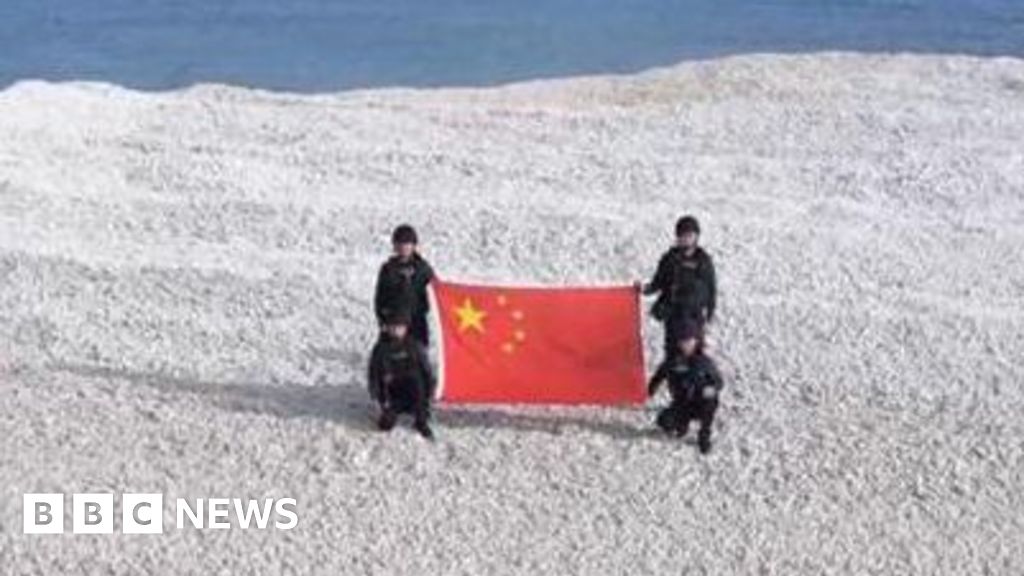Beijing's South China Sea Grab: Seizing a Tiny Sandbank – A Bold Assertion of Power?
China's assertive actions in the South China Sea continue to escalate tensions in the region. Recent reports highlight Beijing's seizure of a tiny sandbank, a seemingly insignificant act with potentially significant geopolitical implications. This seemingly small land grab underscores China's larger ambition to control this strategically vital waterway and its resources.
The Whitsun Reef Incident: A Case Study
While the specifics of the latest seizure remain somewhat shrouded in secrecy, the incident at Whitsun Reef in 2021 serves as a chilling precedent. The sudden appearance of hundreds of Chinese fishing vessels, many believed to be disguised militia, near the reef sparked international condemnation. This massing of vessels effectively paralyzed the reef, denying access to Filipino fishermen who had traditionally fished there for generations. The incident highlighted China's willingness to use ambiguous tactics to assert its claims.
More Than Just Sand: The Strategic Importance of the South China Sea
The South China Sea is not just a body of water; it's a crucial shipping lane, rich in fisheries, and potentially brimming with vast reserves of oil and natural gas. Control over this region translates to immense economic and military power. China's actions, including the seizure of this small sandbank, are seen by many as a calculated strategy to solidify its control over this vital area.
Beijing's Claims and the International Response:
China's claim to almost the entirety of the South China Sea, based on its so-called "nine-dash line," is widely disputed by neighboring countries and international law. The United Nations Convention on the Law of the Sea (UNCLOS) largely rejects China's sweeping claim. The recent seizure of the sandbank further challenges the international legal framework and strengthens concerns about China’s disregard for international norms.
- The Philippines: The Philippines, directly affected by China’s actions, continues to vocally oppose Beijing's claims and seeks support from international allies.
- Vietnam: Vietnam, another claimant state, has also repeatedly protested China’s actions in the South China Sea.
- United States: The United States, while not a claimant state, regularly conducts freedom of navigation operations in the South China Sea to challenge China’s aggressive actions.
- ASEAN: The Association of Southeast Asian Nations (ASEAN) has struggled to find a unified response to China’s assertive behavior, reflecting the diverse interests and relationships within the bloc.
The Implications of China's Actions:
The seizure of even a small sandbank has significant implications:
- Increased Regional Tensions: China's actions are likely to further escalate tensions in the region, increasing the risk of miscalculation and conflict.
- Erosion of International Law: China's disregard for international law sets a dangerous precedent, potentially undermining the stability of the international order.
- Economic Disruption: Control over vital shipping lanes could be used to disrupt global trade, impacting global economies.
- Environmental Damage: The militarization of the South China Sea poses risks to the delicate marine environment.
Conclusion: The ongoing saga of China's actions in the South China Sea, including the recent seizure of a small sandbank, demonstrates Beijing's unwavering determination to control this strategically important region. The international community must remain vigilant and work together to ensure that China's actions are in accordance with international law and do not jeopardize regional peace and stability. The future of the South China Sea, and indeed global stability, hangs in the balance.
Further Reading:
- [Link to a relevant article from a reputable news source, e.g., The Diplomat]
- [Link to a relevant article from a think tank, e.g., CSIS]
- [Link to a relevant UNCLOS document]
Keywords: South China Sea, Beijing, China, sandbank, seizure, Whitsun Reef, nine-dash line, UNCLOS, Philippines, Vietnam, United States, ASEAN, geopolitical, international law, territorial dispute, maritime dispute, regional tensions, freedom of navigation.

